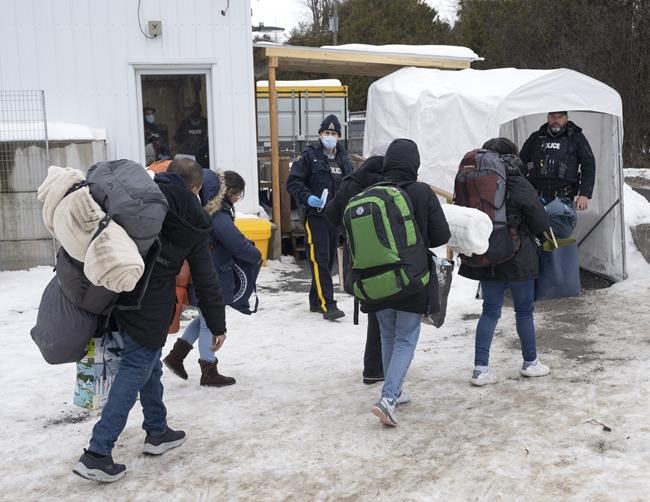OTTAWA — A parliamentary committee has called for Canada's Safe Third Country Agreement with the United States to include new exemptions allowing some asylum seekers to make claims in Canada after arriving south of the border.
The agreement, first signed in 2004, means asylum seekers must make their claim wherever they arrive first — and they are turned away if they try to cross the border to make a claim in the other country.
But on Tuesday, the House of Commons immigration committee tabled a report that calls for Canada to negotiate exceptions to that rule, particularly when it comes to people who have experienced gender-based violence.
"As it stands, existing exceptions are limited to considerations for family unity, the best interests of children and public interest," the committee wrote in its report.
The only public-interest exemption that has been used to date applies to people facing the death penalty, the committee said.
Witnesses suggested that the committee encourage the government to negotiate greater flexibility for those who may not have equal access to the same protections in both countries.
Immigration lawyer Maureen Silcoff told the committee in November that claimants who seek asylum due to female genital mutilation, domestic violence or the fear of sexual assault face more-restrictive laws in the U.S. and are more likely to be offered protection in Canada.
U.S. President Joe Biden pledged to restore asylum provisions for domestic violence survivors in 2021, but the committee said there is still concern about the viability of gender-based claims made on American soil.
The House of Commons committee had made a similar recommendation in 2002, when the Safe Third Country Agreement was first being considered.
In their Tuesday report, members of the committee also recommended that the two countries reinstate an exemption to the agreement that allowed asylum claims at the Canadian border if the claimant was from a country to which Canada did not deport people.
Stephen Harper's Conservative government removed the exemption in 2009, but several refugee organizations — including The Refugee Centre — told the committee it should be put back into place.
Several witnesses also testified before the committee that they felt the United States was not, in fact, a safe country for asylum seekers.
They urged the government to scrap the agreement altogether.
But the report said the government should continue to assert publicly that the United States is a safe third country, and to reaffirm that sentiment in any relevant court proceedings.
Immigration Minister Sean Fraser told the committee in November that suspending the agreement would likely spur thousands of people to make dangerous journeys to migrate to Canada, and could encourage human smugglers to bring people into the country.
Silcoff suggested that Canada could create an another exemption for refugees who are in danger of being incarcerated in American detention centres as a way to address some of the issues that make the U.S. an unsafe country for some asylum seekers.
"The images of kids in cages offer a horrific window into the system that jails vulnerable people when they're simply seeking safety," Silcoff told the committee in November.
"Public-policy exemptions have been a mainstay of our immigration system. It makes sense to put them to use at this point."
That recommendation was not adopted by the committee, however.
Even as some advocates continue to call for an end to the agreement, Prime Minister Justin Trudeau and Biden announced their plans to expand it during the president's visit to Ottawa in March, effectively closing a loophole that saw tens of thousands of migrants cross into Canada each year.
The agreement now applies to all 8,900 kilometres of the shared border between the United States and Canada, not just official crossings as it had before.
Meanwhile, the future of the agreement could be decided by the Supreme Court of Canada, which is expected to rule shortly on whether or not it abides by Canada's constitution.
Immigration, Refugees and Citizenship Canada has started working on contingency plans in case the court strikes the agreement down, and the Crown has asked for a one-year grace period if that happens.
This report by The Canadian Press was first published May 16, 2023.
Laura Osman, The Canadian Press




